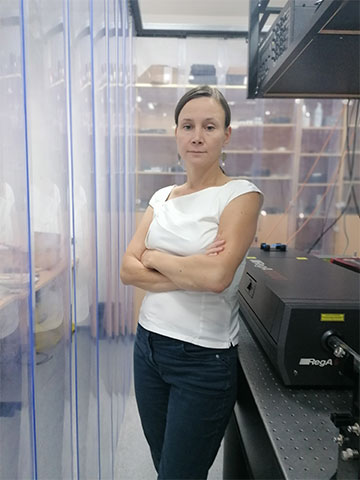
Jovana Petrovic
In this installment of Senior Member Insights, OPN talks with Jovana Petrovic, a research professor at the Vinca Institute, University of Belgrade, Serbia. Prior to her posting at Belgrade, she served as a guest lecturer at TU Berlin (Germany) and scientist at DESY (Germany), LENS (Italy), University of Oxford (UK) and Aston University (UK).
Her research interests include photonic sensors, integrated optical devices and ultrafast lasers. She has successfully led a number of research, innovation and networking projects and consulted high-tech companies and funding bodies. Petrovic’s work has been recognized through her appointments as a senior member of Optica, DESY Stephenson Distinguished Visitor, L’Oreal Women in Science awardee for Serbia, and overseas research scholar of the UK government.
What first interested you in pursuing science?
I have always been fascinated by the deep understanding of nature that people are able to gain and even more so by how people apply this knowledge to construct new things. As a child, I wondered how a clock, airplane or computer worked. I wanted to make things.
What aspect of your current work do you find the most interesting or exciting?
Experimenting. The thrill of coming up with an idea, testing it in a lab, realizing how things work and approaching a solution is irreplaceable.
What tips for successful networking do you have for early-career professionals?
I would recommend not hesitating to apply for positions, fellowships, universities and institutes or contact the colleagues whom you respect, want to work with and learn from—no matter how well-known or famous they are. Make strong connections and nurture them. Be active and use networking as a tool, not for its own sake.
What professional resources do you rely on to stay active and engaged with your field?
I mostly rely on publications and regular communication with peers from academia and industry, be it one-to-one or at meetings, conferences and seminars. I also appreciate the information I gain through participation in grant proposal evaluation and project-monitoring committees, online lectures and podcasts.
What skills do you think are most important for someone interested in a career like yours?
A good understanding of physical and mathematical models and their relation to experiments; technical skills; distilling relevant and reliable information and structuring it in a logical way. Also, a kind of bravery to venture into the unknown and take risks.
What advice do you have for young scientists who are discouraged about their current work or career path?
Both discouragement and satisfaction are temporary—the wheels will turn. To ensure that they turn forward, make your own decisions that are well-informed and based on systematic reasoning and personal preferences. Find an experienced and supportive mentor.
What is one piece of advice that you wish you were given as a student/early in your career?
I wish I were aware of the multitude of skills needed to succeed in contemporary science, in particular, that a deep understanding of physics and technical knowledge are necessary but not sufficient.
What has been the most motivating factor throughout your career?
There have been two strong motivating factors. The first is my curiosity to understand and discover how things work. It has pushed me towards science. The second is the need to contribute to the well-being of people around me, which turned into work on developing technologies for medical diagnostics. I was very happy to find that work in photonics can satisfy both of these incentives.
What habits do you frequently rely on that help you to succeed?
Realistic time planning and sticking to a schedule, building capable teams with well-defined roles and fully devoting myself to the ongoing activity.
If your ten-years-younger self was looking at your career now, what would she be most surprised by?
Probably by the fact that I can read an ECG [electrocardiogram] with a fair understanding.
